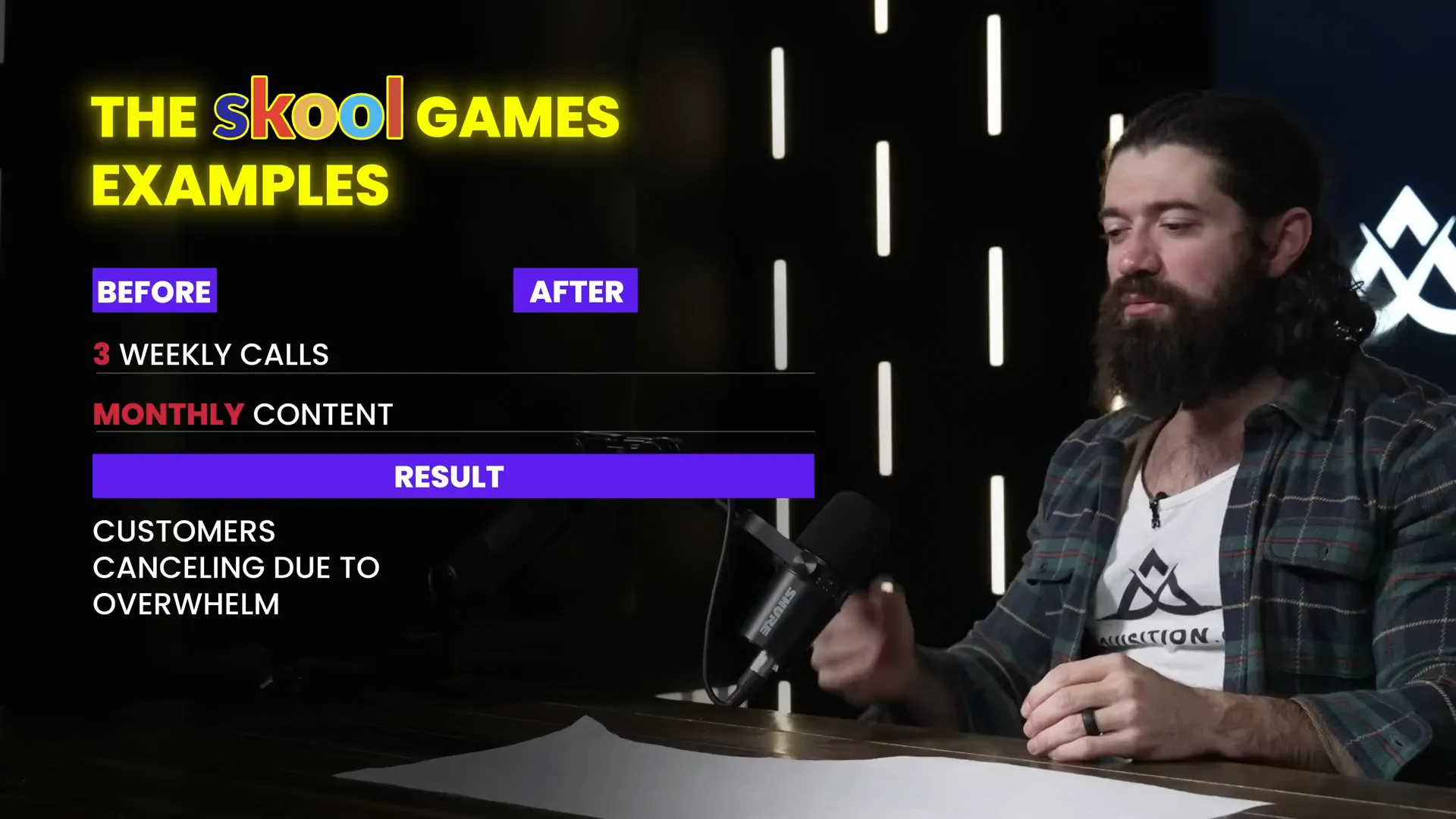Jun 27, 2025
Less is More: The Magic of a Simple Business
In the world of business, simplicity often reigns supreme. I'm Alex Hormozi, founder and managing partner of Acquisition.com, and today, I want to share with you a game-changing idea that can profoundly impact how you think about your business. The essence of this concept is straightforward: keep it simple, but not in the way you might initially think.
The Power of a Simple Message
Imagine you are launching a marketing campaign. You have four key benefits of your product that you want to communicate. Conventional wisdom might lead you to present all four at once. However, just like trying to catch multiple objects thrown at you simultaneously, it's hard for your audience to grasp everything at once. Instead, if you focus on one compelling message, your audience is much more likely to catch it.
This principle is beautifully illustrated by Ken Siegel in his book, Insanely Simple, where he recounts his experiences working with Steve Jobs. Jobs emphasized the importance of distilling messages down to their most essential point. The mantra they lived by was, "Find the most compelling point and communicate it in the most compelling way." This approach isn't just for marketing; it should permeate every aspect of your business, from strategy to product delivery.

Why Simplicity is Harder Than Complexity
Interestingly, achieving simplicity often requires more effort than embracing complexity. Complexity is usually a result of lazy thinking, where we fail to prioritize and end up listing everything we can think of. Many entrepreneurs believe that by presenting multiple features, they can appeal to a broader audience. However, this approach often leads to confusion rather than clarity.
Big business ideas are often counterintuitive. If people's natural instincts were enough to guarantee success, then everyone would be thriving in their ventures. The challenge lies in forcing ourselves to say no to distractions and focus on what truly matters.
Finding the Core Promise
Let’s take a look at a real-world example: Raising Cane's, the chicken restaurant. With just seven items on their menu, they focus on what matters most. This deliberate simplicity allows them to excel in quality and service. The question to ask yourself is: if you only had to deliver one key feature, would it fulfill your business goals?
Frank Slootman, author of Snowball, argues that if you cannot identify the single most important thing in your business, you have failed as a CEO. This is a tough pill to swallow, especially for those of us who juggle multiple priorities.

The One Thing That Could Change Everything
When contemplating your business, consider this question: what one thing, if true twelve months from now, would change everything for your business? This could be establishing a dedicated lead channel, improving cash flow, or securing a reliable talent pool for your operations.
The beauty of focusing on one core objective is that it simplifies everything else. By honing in on this singular goal, you can allocate resources more effectively and potentially make other objectives irrelevant. As you work towards this primary goal, new opportunities and resources may emerge that alter your original priorities.
Patience in Execution
Implementing this singular focus often requires patience. For instance, if you realize that you need to hire more technicians, you might initiate a recruitment campaign. However, the results may not be immediate. You might feel the urge to explore multiple solutions simultaneously, but this can dilute your efforts and resources.
Instead of spreading yourself thin, commit to the one high-leverage action that will yield the most significant impact. This is crucial because attempting to tackle everything at once can lead to "death by a thousand paper cuts." It’s about prioritizing the actions that will drive the most substantial change.

Western vs. Eastern Philosophy: A Business Perspective
Steve Jobs once compared Western and Eastern philosophies of art. Western art often starts with a blank canvas, adding layers until a piece is complete. In contrast, Eastern philosophy emphasizes removing excess to reveal the beauty beneath. This principle applies to business as well. Instead of adding more features, ask yourself what can be removed to simplify the offering.
Jack Dorsey encapsulates this idea with his quote: "Perfect every detail and limit the number of details." If you focus on perfecting one aspect of your business rather than spreading yourself thin across multiple initiatives, you can achieve greater success.
The Struggle of Capability
As you grow in capability and resources, the challenge becomes knowing when to say no. The more opportunities that present themselves, the harder it is to maintain focus. You must embrace the discipline of limiting your offerings to what truly matters.

Strategic Decisions: The Importance of Inversion
To effectively navigate these challenges, consider employing an inversion strategy. Ask yourself: how can I destroy my business? This thought exercise can illuminate the mistakes to avoid. Alternatively, consider how much you can take away while still delivering value. Often, removing distractions enhances the overall experience for your customers.
A real-world example from my own experience involves a community engagement program. Initially, we offered multiple calls and content uploads, but we discovered that overwhelm was the primary reason for cancellations. By simplifying our offerings, we were able to increase retention and satisfaction.
Efficiency Through Focus
When you concentrate on one thing, you enhance efficiency across the board. Fewer meetings are needed, and clearer communication channels emerge. This streamlined approach allows your team to work more effectively, as they are no longer bogged down by conflicting priorities.

The Results of Focused Efforts
The difference between a business operating at a 90% efficiency and one at 95% or even 99% can be staggering. The latter can capture the market and cultivate a positive reputation. This principle emphasizes the need to identify the "need to believes" in your business—those pivotal changes that can drive exponential growth.
We often think in terms of incremental improvements, but what we should be seeking are orders of magnitude changes that can redefine our trajectory.
Making the Right Bets
As you allocate your resources, think about how to make the most impactful bets. If you have a certain percentage of your team available, focus that capacity on the one initiative that will yield the highest returns. This requires you to be strategic about how you use your team’s skills and time.

Removing Distractions for Success
To foster a culture of focus, regularly revisit your priorities. What can be eliminated to enhance clarity and execution? This is where the philosophy of simplicity shines. The fewer distractions your team faces, the more effective they can be in achieving the singular goal you've set.
It’s essential to communicate this focus clearly. When your team understands the primary objective, they can rally around it. This simplified message is not just easier to remember; it's also easier to sell and deliver upon.
Conclusion: Embrace Simplicity for Business Success
In conclusion, the power of simplicity in business cannot be overstated. By focusing on one compelling message, one core objective, and one high-leverage action, you can streamline your efforts and achieve extraordinary results. Remember, it's not just about doing more; it's about doing what matters most.
If you found this discussion valuable, I encourage you to explore more insights on entrepreneurship and business strategy. You can download your free scaling roadmap here or check out our offerings at GFunnel.
FAQ
- What is the main takeaway from this article?
The central theme is that simplicity in business strategy leads to better focus, efficiency, and ultimately greater success. - How can I apply these principles in my business?
Identify the one core promise or feature that matters most to your customers and focus your efforts on delivering it exceptionally. - Why is it harder to achieve simplicity?
Simplicity often requires deeper strategic thinking and prioritization, making it more challenging than simply adding more complexity.
Keep crushing it, and may your desires be greater than your obstacles. Never quit!